ENGL 102 Fiction Essay: Comparing 'The Lottery' and 'Winner'
VerifiedAdded on 2022/09/15
|6
|1260
|18
Essay
AI Summary
This essay provides a comparative analysis of Shirley Jackson's "The Lottery" and D.H. Lawrence's "The Rocking Horse Winner," focusing on their themes, symbolism, and authorial intent. The essay highlights the contrasting endings and thematic concerns of both stories, such as victimization, brutality, the dangers of tradition, love, and materialism. It explores how the authors use symbols, such as the black box in "The Lottery" and the rocking horse in "The Rocking Horse Winner," to convey their core messages. The essay also examines the authors' tones and styles, noting the negative and sarcastic tones in both stories, and the use of irony to emphasize the struggles of the characters. Overall, the essay provides a detailed comparison of the two stories, exploring their similarities and differences in terms of theme, symbolism, and authorial purpose.
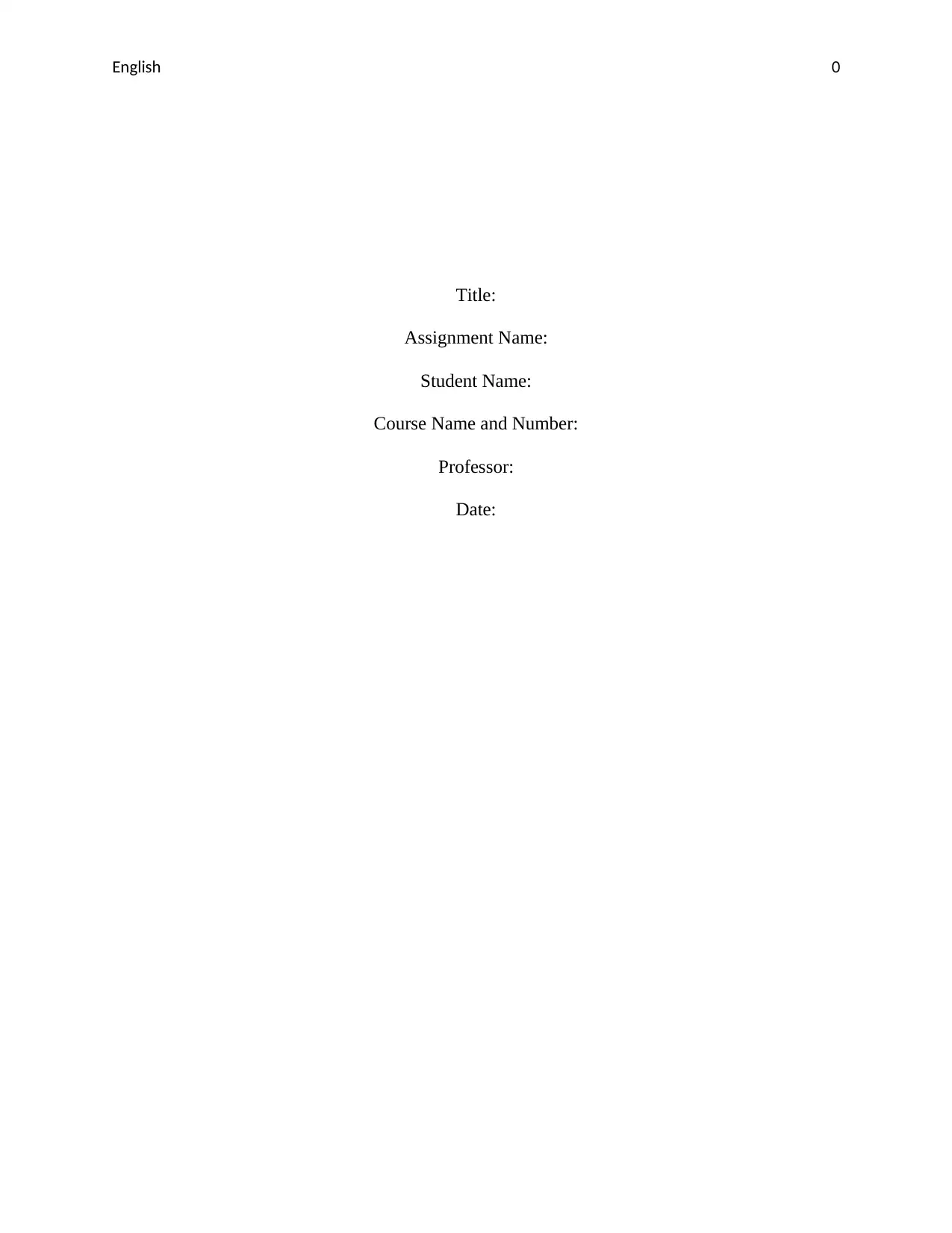
English 0
Title:
Assignment Name:
Student Name:
Course Name and Number:
Professor:
Date:
Title:
Assignment Name:
Student Name:
Course Name and Number:
Professor:
Date:
Paraphrase This Document
Need a fresh take? Get an instant paraphrase of this document with our AI Paraphraser
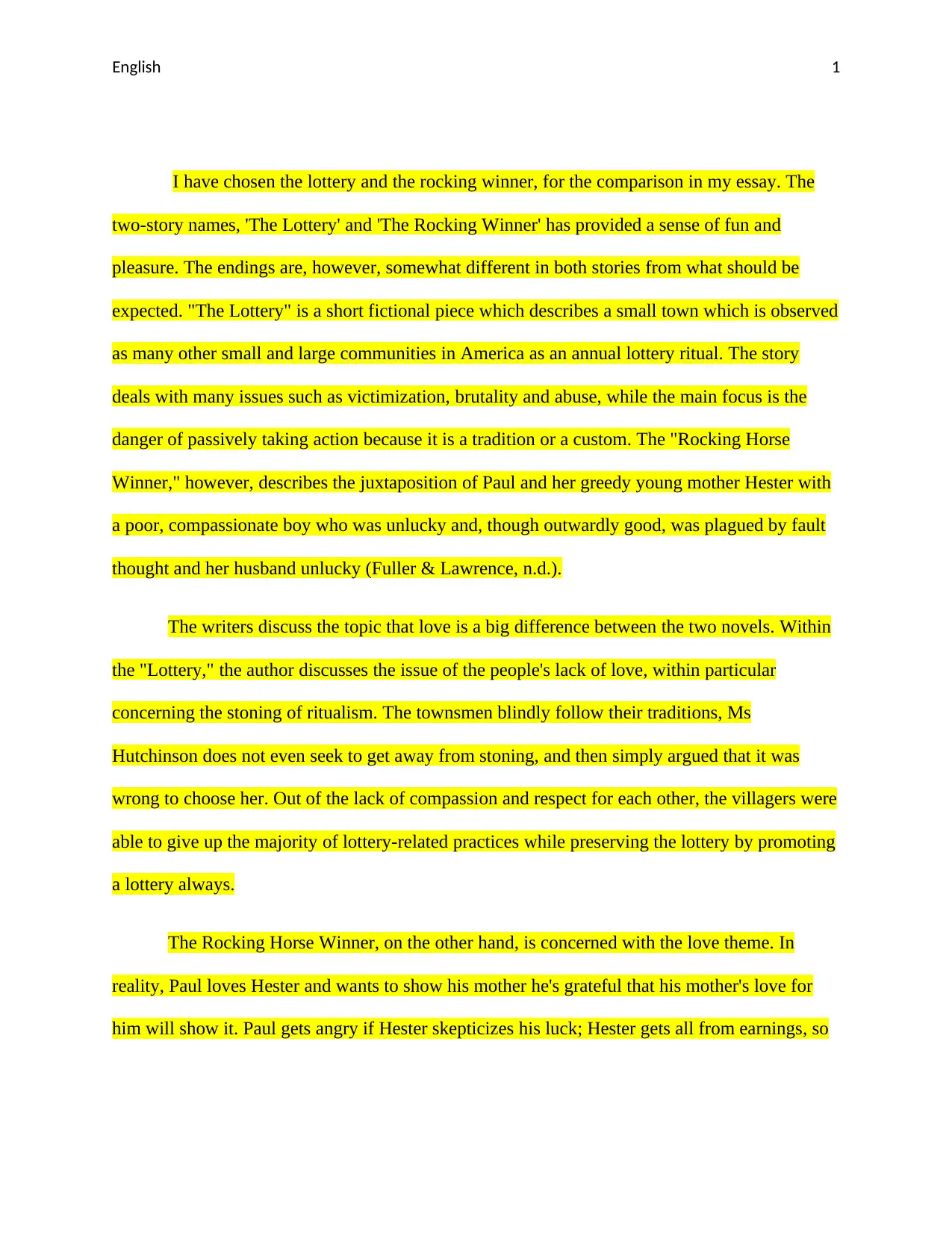
English 1
I have chosen the lottery and the rocking winner, for the comparison in my essay. The
two-story names, 'The Lottery' and 'The Rocking Winner' has provided a sense of fun and
pleasure. The endings are, however, somewhat different in both stories from what should be
expected. "The Lottery" is a short fictional piece which describes a small town which is observed
as many other small and large communities in America as an annual lottery ritual. The story
deals with many issues such as victimization, brutality and abuse, while the main focus is the
danger of passively taking action because it is a tradition or a custom. The "Rocking Horse
Winner," however, describes the juxtaposition of Paul and her greedy young mother Hester with
a poor, compassionate boy who was unlucky and, though outwardly good, was plagued by fault
thought and her husband unlucky (Fuller & Lawrence, n.d.).
The writers discuss the topic that love is a big difference between the two novels. Within
the "Lottery," the author discusses the issue of the people's lack of love, within particular
concerning the stoning of ritualism. The townsmen blindly follow their traditions, Ms
Hutchinson does not even seek to get away from stoning, and then simply argued that it was
wrong to choose her. Out of the lack of compassion and respect for each other, the villagers were
able to give up the majority of lottery-related practices while preserving the lottery by promoting
a lottery always.
The Rocking Horse Winner, on the other hand, is concerned with the love theme. In
reality, Paul loves Hester and wants to show his mother he's grateful that his mother's love for
him will show it. Paul gets angry if Hester skepticizes his luck; Hester gets all from earnings, so
I have chosen the lottery and the rocking winner, for the comparison in my essay. The
two-story names, 'The Lottery' and 'The Rocking Winner' has provided a sense of fun and
pleasure. The endings are, however, somewhat different in both stories from what should be
expected. "The Lottery" is a short fictional piece which describes a small town which is observed
as many other small and large communities in America as an annual lottery ritual. The story
deals with many issues such as victimization, brutality and abuse, while the main focus is the
danger of passively taking action because it is a tradition or a custom. The "Rocking Horse
Winner," however, describes the juxtaposition of Paul and her greedy young mother Hester with
a poor, compassionate boy who was unlucky and, though outwardly good, was plagued by fault
thought and her husband unlucky (Fuller & Lawrence, n.d.).
The writers discuss the topic that love is a big difference between the two novels. Within
the "Lottery," the author discusses the issue of the people's lack of love, within particular
concerning the stoning of ritualism. The townsmen blindly follow their traditions, Ms
Hutchinson does not even seek to get away from stoning, and then simply argued that it was
wrong to choose her. Out of the lack of compassion and respect for each other, the villagers were
able to give up the majority of lottery-related practices while preserving the lottery by promoting
a lottery always.
The Rocking Horse Winner, on the other hand, is concerned with the love theme. In
reality, Paul loves Hester and wants to show his mother he's grateful that his mother's love for
him will show it. Paul gets angry if Hester skepticizes his luck; Hester gets all from earnings, so
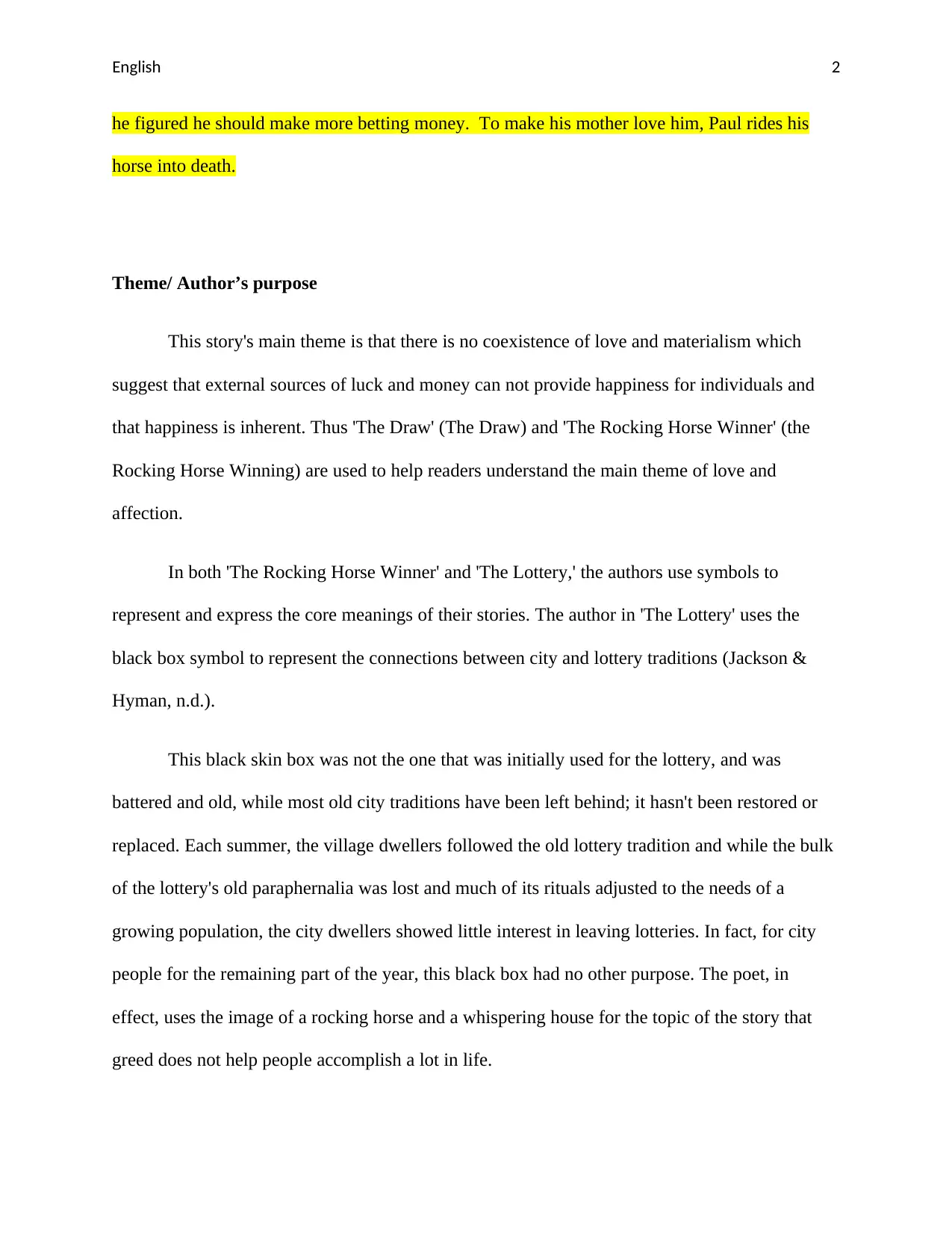
English 2
he figured he should make more betting money. To make his mother love him, Paul rides his
horse into death.
Theme/ Author’s purpose
This story's main theme is that there is no coexistence of love and materialism which
suggest that external sources of luck and money can not provide happiness for individuals and
that happiness is inherent. Thus 'The Draw' (The Draw) and 'The Rocking Horse Winner' (the
Rocking Horse Winning) are used to help readers understand the main theme of love and
affection.
In both 'The Rocking Horse Winner' and 'The Lottery,' the authors use symbols to
represent and express the core meanings of their stories. The author in 'The Lottery' uses the
black box symbol to represent the connections between city and lottery traditions (Jackson &
Hyman, n.d.).
This black skin box was not the one that was initially used for the lottery, and was
battered and old, while most old city traditions have been left behind; it hasn't been restored or
replaced. Each summer, the village dwellers followed the old lottery tradition and while the bulk
of the lottery's old paraphernalia was lost and much of its rituals adjusted to the needs of a
growing population, the city dwellers showed little interest in leaving lotteries. In fact, for city
people for the remaining part of the year, this black box had no other purpose. The poet, in
effect, uses the image of a rocking horse and a whispering house for the topic of the story that
greed does not help people accomplish a lot in life.
he figured he should make more betting money. To make his mother love him, Paul rides his
horse into death.
Theme/ Author’s purpose
This story's main theme is that there is no coexistence of love and materialism which
suggest that external sources of luck and money can not provide happiness for individuals and
that happiness is inherent. Thus 'The Draw' (The Draw) and 'The Rocking Horse Winner' (the
Rocking Horse Winning) are used to help readers understand the main theme of love and
affection.
In both 'The Rocking Horse Winner' and 'The Lottery,' the authors use symbols to
represent and express the core meanings of their stories. The author in 'The Lottery' uses the
black box symbol to represent the connections between city and lottery traditions (Jackson &
Hyman, n.d.).
This black skin box was not the one that was initially used for the lottery, and was
battered and old, while most old city traditions have been left behind; it hasn't been restored or
replaced. Each summer, the village dwellers followed the old lottery tradition and while the bulk
of the lottery's old paraphernalia was lost and much of its rituals adjusted to the needs of a
growing population, the city dwellers showed little interest in leaving lotteries. In fact, for city
people for the remaining part of the year, this black box had no other purpose. The poet, in
effect, uses the image of a rocking horse and a whispering house for the topic of the story that
greed does not help people accomplish a lot in life.
⊘ This is a preview!⊘
Do you want full access?
Subscribe today to unlock all pages.

Trusted by 1+ million students worldwide
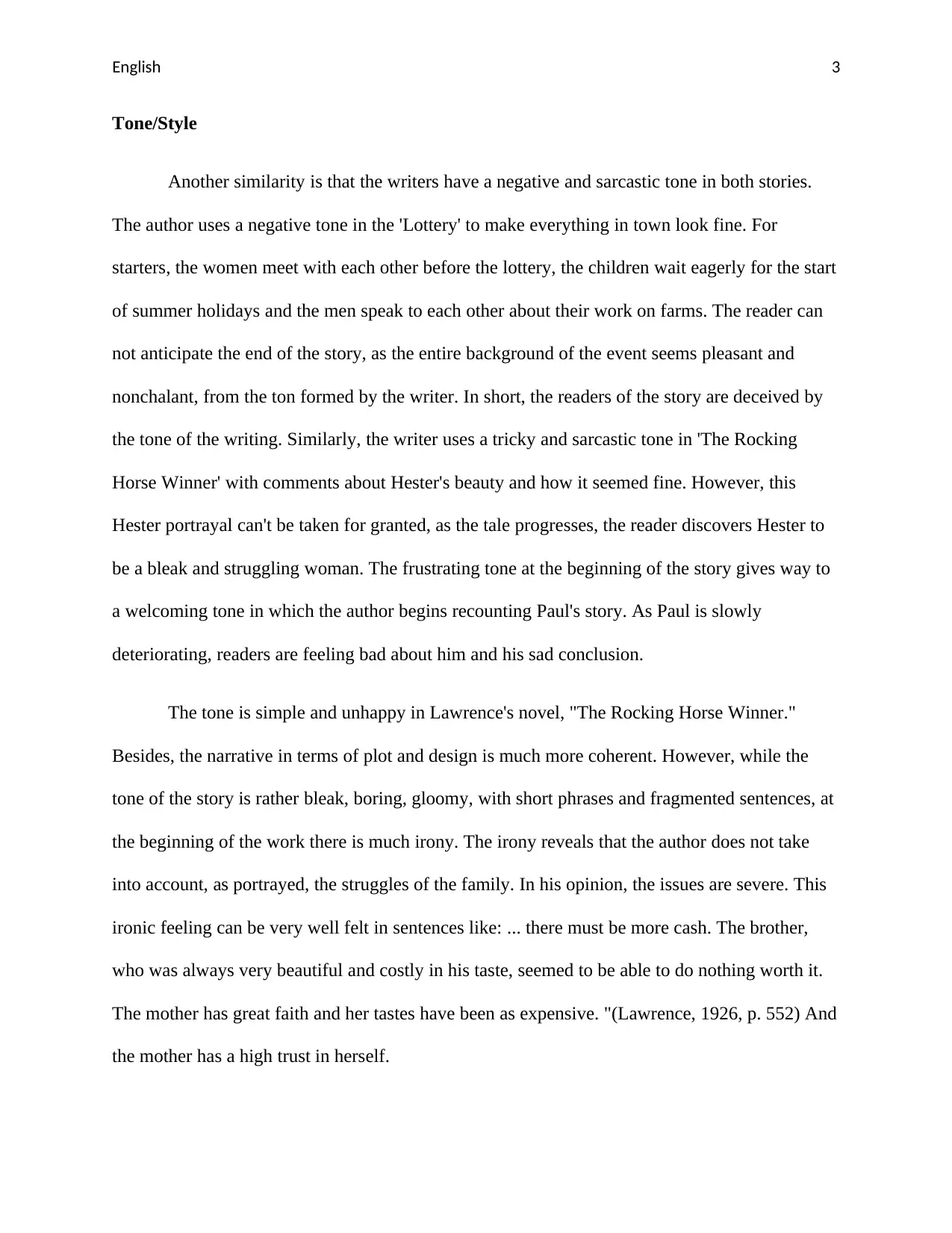
English 3
Tone/Style
Another similarity is that the writers have a negative and sarcastic tone in both stories.
The author uses a negative tone in the 'Lottery' to make everything in town look fine. For
starters, the women meet with each other before the lottery, the children wait eagerly for the start
of summer holidays and the men speak to each other about their work on farms. The reader can
not anticipate the end of the story, as the entire background of the event seems pleasant and
nonchalant, from the ton formed by the writer. In short, the readers of the story are deceived by
the tone of the writing. Similarly, the writer uses a tricky and sarcastic tone in 'The Rocking
Horse Winner' with comments about Hester's beauty and how it seemed fine. However, this
Hester portrayal can't be taken for granted, as the tale progresses, the reader discovers Hester to
be a bleak and struggling woman. The frustrating tone at the beginning of the story gives way to
a welcoming tone in which the author begins recounting Paul's story. As Paul is slowly
deteriorating, readers are feeling bad about him and his sad conclusion.
The tone is simple and unhappy in Lawrence's novel, "The Rocking Horse Winner."
Besides, the narrative in terms of plot and design is much more coherent. However, while the
tone of the story is rather bleak, boring, gloomy, with short phrases and fragmented sentences, at
the beginning of the work there is much irony. The irony reveals that the author does not take
into account, as portrayed, the struggles of the family. In his opinion, the issues are severe. This
ironic feeling can be very well felt in sentences like: ... there must be more cash. The brother,
who was always very beautiful and costly in his taste, seemed to be able to do nothing worth it.
The mother has great faith and her tastes have been as expensive. "(Lawrence, 1926, p. 552) And
the mother has a high trust in herself.
Tone/Style
Another similarity is that the writers have a negative and sarcastic tone in both stories.
The author uses a negative tone in the 'Lottery' to make everything in town look fine. For
starters, the women meet with each other before the lottery, the children wait eagerly for the start
of summer holidays and the men speak to each other about their work on farms. The reader can
not anticipate the end of the story, as the entire background of the event seems pleasant and
nonchalant, from the ton formed by the writer. In short, the readers of the story are deceived by
the tone of the writing. Similarly, the writer uses a tricky and sarcastic tone in 'The Rocking
Horse Winner' with comments about Hester's beauty and how it seemed fine. However, this
Hester portrayal can't be taken for granted, as the tale progresses, the reader discovers Hester to
be a bleak and struggling woman. The frustrating tone at the beginning of the story gives way to
a welcoming tone in which the author begins recounting Paul's story. As Paul is slowly
deteriorating, readers are feeling bad about him and his sad conclusion.
The tone is simple and unhappy in Lawrence's novel, "The Rocking Horse Winner."
Besides, the narrative in terms of plot and design is much more coherent. However, while the
tone of the story is rather bleak, boring, gloomy, with short phrases and fragmented sentences, at
the beginning of the work there is much irony. The irony reveals that the author does not take
into account, as portrayed, the struggles of the family. In his opinion, the issues are severe. This
ironic feeling can be very well felt in sentences like: ... there must be more cash. The brother,
who was always very beautiful and costly in his taste, seemed to be able to do nothing worth it.
The mother has great faith and her tastes have been as expensive. "(Lawrence, 1926, p. 552) And
the mother has a high trust in herself.
Paraphrase This Document
Need a fresh take? Get an instant paraphrase of this document with our AI Paraphraser
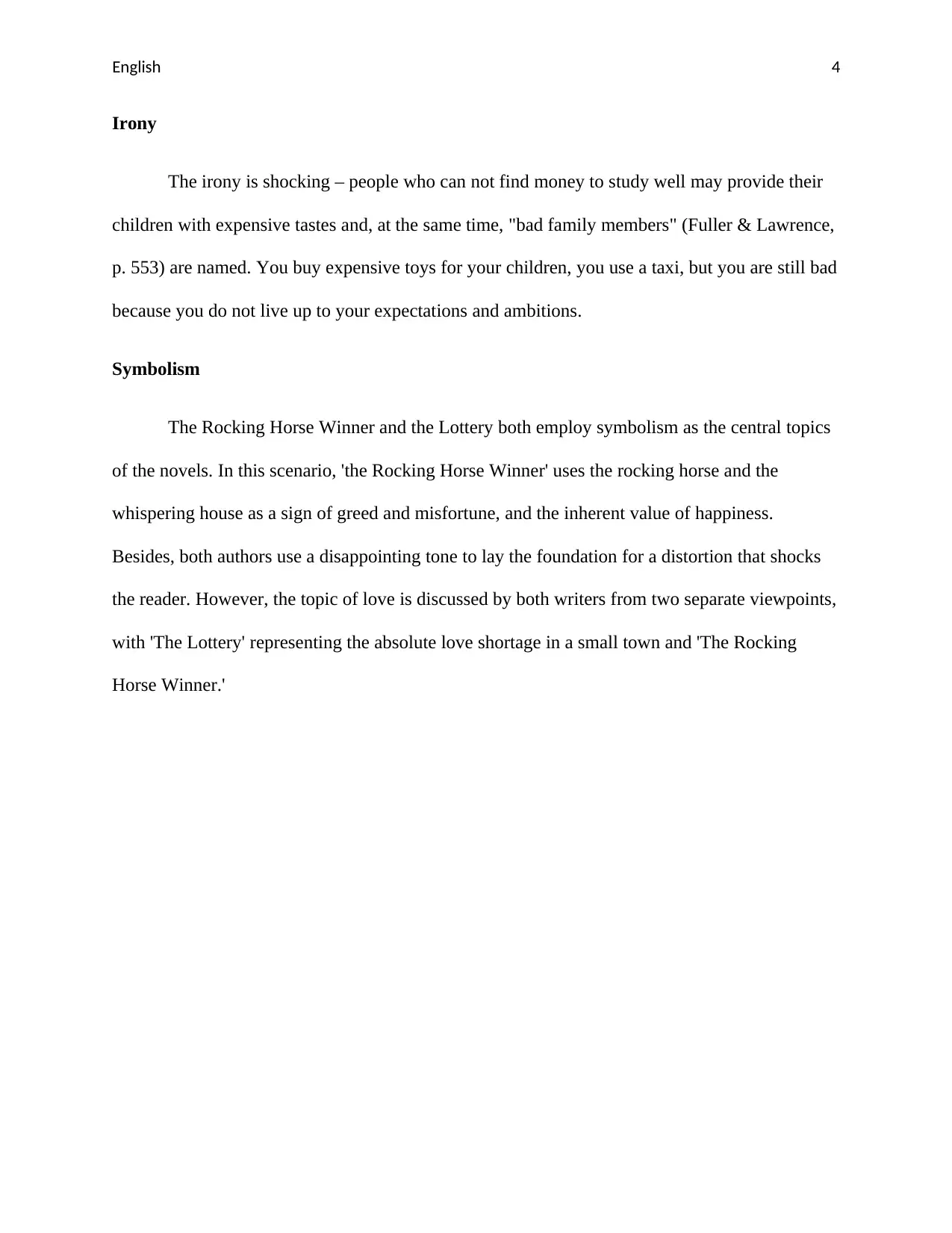
English 4
Irony
The irony is shocking – people who can not find money to study well may provide their
children with expensive tastes and, at the same time, "bad family members" (Fuller & Lawrence,
p. 553) are named. You buy expensive toys for your children, you use a taxi, but you are still bad
because you do not live up to your expectations and ambitions.
Symbolism
The Rocking Horse Winner and the Lottery both employ symbolism as the central topics
of the novels. In this scenario, 'the Rocking Horse Winner' uses the rocking horse and the
whispering house as a sign of greed and misfortune, and the inherent value of happiness.
Besides, both authors use a disappointing tone to lay the foundation for a distortion that shocks
the reader. However, the topic of love is discussed by both writers from two separate viewpoints,
with 'The Lottery' representing the absolute love shortage in a small town and 'The Rocking
Horse Winner.'
Irony
The irony is shocking – people who can not find money to study well may provide their
children with expensive tastes and, at the same time, "bad family members" (Fuller & Lawrence,
p. 553) are named. You buy expensive toys for your children, you use a taxi, but you are still bad
because you do not live up to your expectations and ambitions.
Symbolism
The Rocking Horse Winner and the Lottery both employ symbolism as the central topics
of the novels. In this scenario, 'the Rocking Horse Winner' uses the rocking horse and the
whispering house as a sign of greed and misfortune, and the inherent value of happiness.
Besides, both authors use a disappointing tone to lay the foundation for a distortion that shocks
the reader. However, the topic of love is discussed by both writers from two separate viewpoints,
with 'The Lottery' representing the absolute love shortage in a small town and 'The Rocking
Horse Winner.'
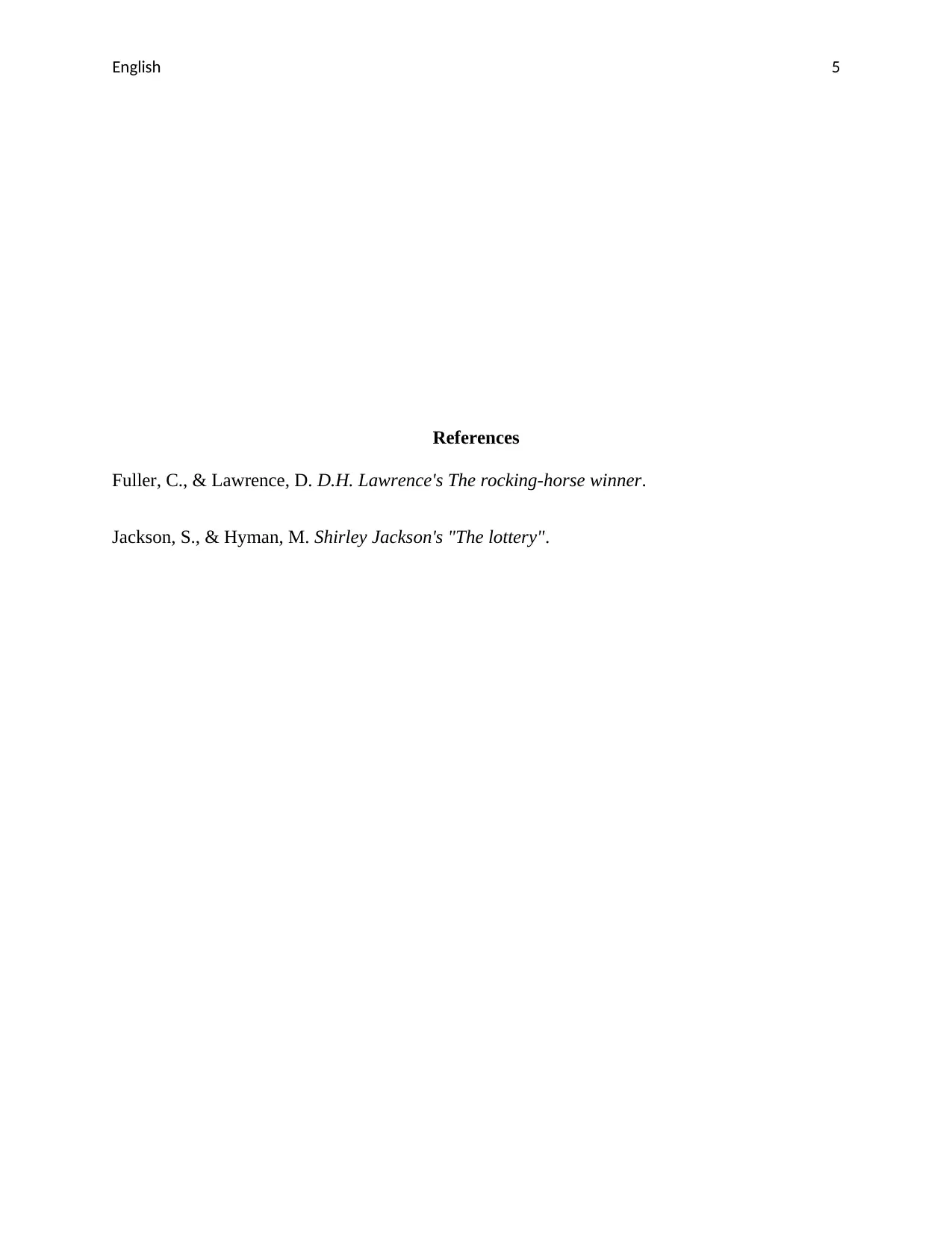
English 5
References
Fuller, C., & Lawrence, D. D.H. Lawrence's The rocking-horse winner.
Jackson, S., & Hyman, M. Shirley Jackson's "The lottery".
References
Fuller, C., & Lawrence, D. D.H. Lawrence's The rocking-horse winner.
Jackson, S., & Hyman, M. Shirley Jackson's "The lottery".
⊘ This is a preview!⊘
Do you want full access?
Subscribe today to unlock all pages.

Trusted by 1+ million students worldwide
1 out of 6
Your All-in-One AI-Powered Toolkit for Academic Success.
+13062052269
info@desklib.com
Available 24*7 on WhatsApp / Email
![[object Object]](/_next/static/media/star-bottom.7253800d.svg)
Unlock your academic potential
Copyright © 2020–2025 A2Z Services. All Rights Reserved. Developed and managed by ZUCOL.